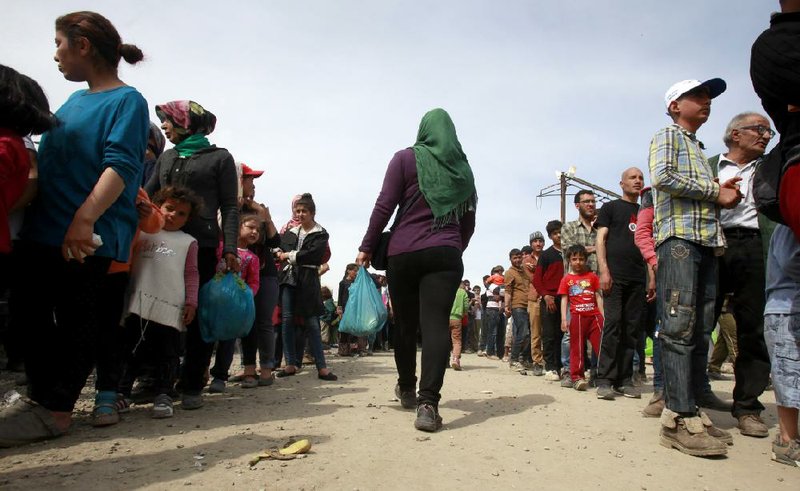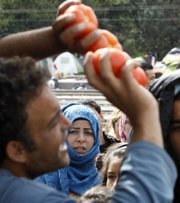ATHENS, Greece -- Greece is pressing ahead with plans to start deporting migrants and refugees back to Turkey next week.
Lawmakers in Athens voted 169-107 on Friday to back the draft of a bill, fast-tracked through Parliament, to allow the returns to start as soon as Monday.
The operation would see migrants and refugees who arrived on Greek islands after March 20 put on boats and sent back to Turkey.
Several Greek officials with knowledge of the planning said deportations are likely to start from the island of Lesbos with migrants from Afghanistan, Pakistan and other countries whose asylum claims are considered inadmissible.
The transport, the officials said, will be carried out under heavy security escort -- with one police minder for every migrant -- using buses that will travel from island detention camps and are likely to board straight onto chartered vessels.
The officials asked not to be identified because plans for the forced returns have not been formally announced.
The imminent deportations, which are backed by the European Union after its recent agreement with Turkey, triggered more violence at detention camps in Greece.
Authorities on the Greek island of Chios said several hundred people pushed their way out of an overcrowded detention camp and staged a peaceful protest in the island's main town, chanting "freedom, freedom" and "Turkey no." The rally followed overnight clashes between Syrian and Afghan detainees that left five people injured.
More protests are planned for today on the island.
Greek officials did not respond to the criticism directly but insisted the rights of detained asylum seekers were being protected.
"I assure you that we will strictly observe human-rights procedures, not what people are inventing, but what is required under the circumstances," Migration Affairs Minister Ioannis Mouzalas told Parliament.
The clashes on Chios were the latest in a series of violent episodes at shelters and gathering points across Greece, where more than 52,000 migrants and refugees are stranded because of EU-supported Balkan border closures.
More than 11,000 of those stranded remain camped out at the Greek-Macedonian border, ignoring calls by the government to move voluntarily to organized shelters.
Many say they have heard conditions in other camps are worse, and they fear what they might find if they are forced to move.
Karzan Kmaran, 28, who is from near Mosul, Iraq, said he still hoped that the borders would open.
"We are waiting for hope. Here, the place is very sad for the people, and we don't know what to do," he said, standing by people lining up for food and baby milk. "The people, they don't want to stay in Greece, because Greece now is in crisis, the economy is so bad."
Mohammed Ali, 45, a pharmacologist from the embattled town of Deir el-Zour, fled Syria with his 19-year-old son, fearing that the young man would be forcibly recruited by the Syrian army or killed by the Islamic State group. They have been in the camp for a month.
"Look at these people here," he said, sweeping his arm across the camp as its residents began to stir at daybreak. "You know Victor Hugo, the French writer? He wrote a book -- Les Miserables. In the 21st century, we stand in the land of Hugo."
Ali said he was "a rich man" in Syria.
"I had two houses, and a car. But with the war, everything is lost," he said. His houses were damaged in Russian airstrikes. "I had a car, a Mazda. Gone, too. Now I have shoes instead. They are my Formula 1."
Ban to Nations: Step Up
In Geneva, the United Nations refugee agency urged Greece and Turkey to provide further safeguards for asylum seekers before the returns begin, noting that conditions were worsening by the day for more than 4,000 people being held in detention on Greek islands.
Earlier this week, U.N. Secretary-General Ban Ki-moon exhorted countries around the world to step up to their responsibilities and take in half a million Syrian refugees, rebuking political leaders who he said had instead resorted to demonizing asylum seekers.
Opening a one-day ministerial conference in Geneva convened by the U.N. refugee agency, Ban called for "an exponential increase in global solidarity" in urging countries to accept about 480,000 Syrians over the next three years.
"Neighboring countries have done far more than their share," Ban said, alluding to the nearly 5 million migrants received by Turkey, Lebanon, Jordan and Iraq. "Others must now step up."
Demonizing refugees and migrants was "not only demeaning, offensive and counterproductive but factually wrong," Ban said, emphasizing the skills and other resources they brought to host countries. "I call on leaders to counter fearmongering with reassurance, and to fight inaccurate information with the truth."
Counting pledges to resettle 179,000 refugees the U.N. refugee agency has received since 2013, the agency is looking for commitments to take an additional 300,000 people.
Ban's appeal elicited many pledges of support and solidarity, but adding up the commitments made Wednesday, Filippo Grandi, head of the refugee agency, said the meeting had raised the number of places pledged for Syrians by some 6,000, although other promises could open the way for tens of thousands more.
Still, U.N. officials had expected little else, stressing the Geneva meeting marked the start of a longer-term process aimed at recalibrating the global response to a crisis that has generated the highest levels of displacement since World War II.
"Within all the gloom and doom of Syria, it was a positive meeting; I come out of it with a lot of confidence," said Volker Turk, assistant high commissioner of the refugee agency. "It has generated a positive momentum for the year."
International donors meeting in London in February had pledged $12 billion in humanitarian aid for Syrian refugees and the countries receiving them, but Grandi said less than half the funds had been allocated so far, calling for speedier disbursement.
"Much more is needed," Grandi said at the meeting. EU countries had not shown "the required solidarity" to share the resettlement of refugees, he said. "We cannot respond to a global refugee crisis by closing doors and building fences."
Group Rips Turkey, EU
Separately, rights group Amnesty International, which has strongly opposed the EU-Turkey agreement from the start, said in a report Friday that it had evidence of Turkish authorities rounding up Syrians and sending them back across the border to their conflict-torn country.
The group said Turkey has been expelling about 100 men, women and children nearly daily since mid-January.
"EU leaders have willfully ignored the simplest of facts: Turkey is not a safe country for Syrian refugees," Amnesty's Europe and Central Asia Director John Dalhuisen said. "Far from pressuring Turkey to improve the protection it offers Syrian refugees, the EU is in fact incentivizing the opposite.
"Having witnessed the creation of Fortress Europe, we are now seeing the copycat construction of Fortress Turkey," he added.
In earlier stages of the conflict, Syrians who held passports were able to cross at regular border gates, and even those who entered illegally could register with the authorities. Now only those needing urgent medical care are allowed to enter and there are an estimated 200,000 displaced Syrians within 12.4 miles of Turkey's border.
Tightened border restrictions and new visa requirements for Syrians, the organization said, have also pushed Syrians into the arms of smugglers who charge an average of $1,000 per crossing.
Amnesty also said Turkish authorities have scaled back the registration of Syrian refugees in the southern provinces, which makes it impossible for them to access basic services.
Information for this article was contributed by Derek Gatopoulos, Elena Becatoros, Lorne Cook, Jamey Keaten, Costas Kantouris and staff members of The Associated Press; and by Nick Cumming-Bruce of The New York Times.
A Section on 04/02/2016



